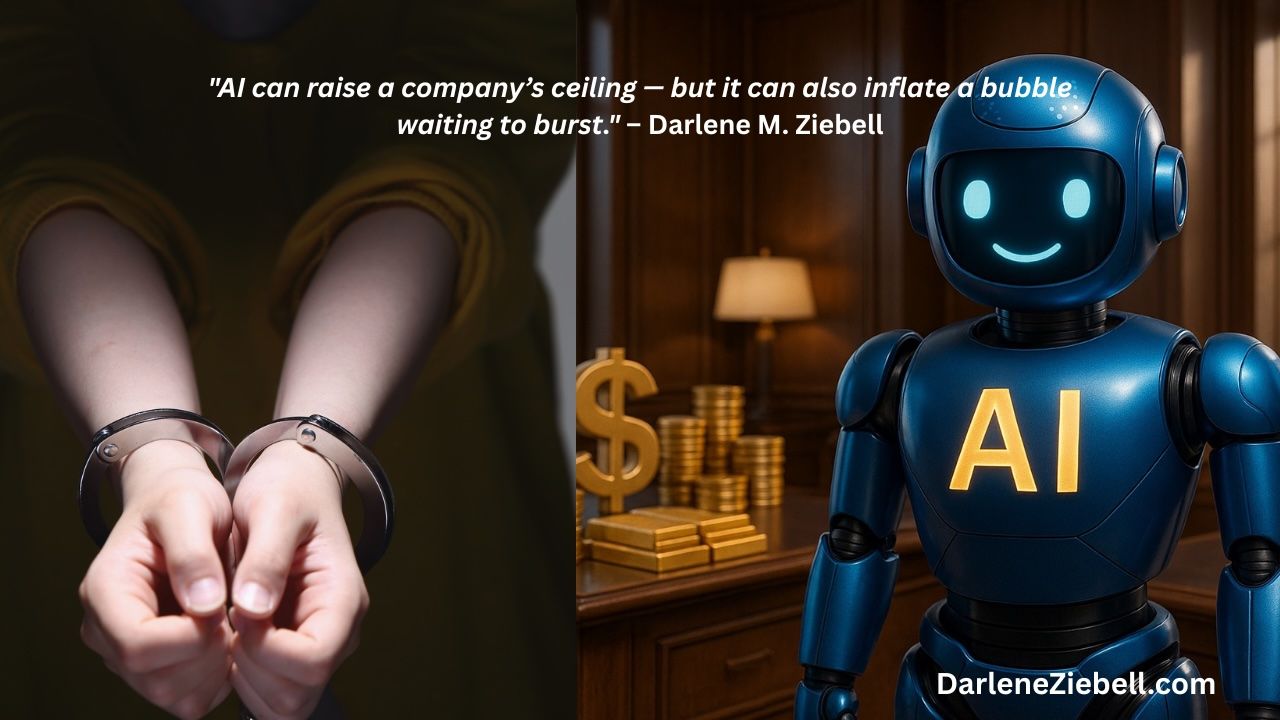AI and Business Valuation: Who’s Creating the Value — Founders or Technology?
Oct 01, 2025
AI and Business Valuation: Who’s Creating the Value — Founders or Technology?
When JPMorgan Chase bought the college financial aid startup Frank for $175 million, they believed they were buying access to millions of student users. What they didn’t know was that the numbers had been grossly inflated. Its founder, Charlie Javice, created fake data to support a sky-high valuation. Today, she’s serving over seven years in prison for fraud.
Her story is a stark reminder that valuations are fragile. They’re based not only on what a company owns and earns, but also on what buyers believe about its potential. And in 2025, nothing carries more promise — or hype — than artificial intelligence (AI).
The question business owners and investors must now ask: When a company’s value skyrockets, is it the owner’s leadership driving it — or is it the technology available to everyone?
The Lesson of Frank: Valuation Can Be Built on Sand
Charlie Javice’s conviction is more than a personal downfall — it’s a warning shot to every entrepreneur. She didn’t just exaggerate her company’s value; she manufactured it with fake data. For JPMorgan, the difference between 300,000 users and the claimed 4 million meant hundreds of millions of dollars.
"Valuation without verification is nothing more than wishful thinking." – Darlene M. Ziebell
In today’s climate, investors want proof. Numbers must be auditable. Business owners can no longer lean on big promises.
How AI Is Reshaping Business Valuation
AI is not a “nice to have” anymore. It is actively changing how businesses are priced in the marketplace.
- Revenue Growth Potential: AI enables new products, services, and smarter monetization models.
- Cost Reduction: Automation, customer service bots, and predictive analytics increase margins.
- Scalability: AI often scales without linear costs, improving profitability.
- Intangibles as Assets: Proprietary data, algorithms, and training models are now considered valuable assets in M&A negotiations.
A 2024 NYU study found that a 1% increase in AI adoption can correlate with a 0.17% rise in firm valuation. Investors are already rewarding companies that deploy AI strategically.
But just as investors once overpaid for dot-com companies in the 1990s, today’s AI bubble risk is real. One of the UK’s leading tech investors recently warned of “disconcerting signs” of an AI stock bubble.
"AI can raise a company’s ceiling — but it can also inflate a bubble waiting to burst." – Darlene M. Ziebell
Who Creates the Value: Founders or Technology?
Here’s the tough question: is AI itself the value driver, or does execution by the owners matter more?
Technology increases potential. Anyone can access ChatGPT, MidJourney, or predictive analytics tools. Publicly available AI raises the entire playing field.
Founders capture value through execution. The difference lies in how a business leader applies it:
- Building proprietary data sets.
- Designing AI-driven products with customer demand in mind.
- Creating distribution channels and customer loyalty.
- Protecting against risks like data leaks, AI hallucinations, or over-reliance on hype.
"Technology may open the door, but only leadership knows how to walk through it." – Darlene M. Ziebell
The New Due Diligence: AI Audits
If Charlie Javice’s fraud teaches us anything, it’s this: due diligence must evolve.
When AI drives value, investors need new layers of analysis:
- Validating datasets.
- Testing AI model performance.
- Verifying customer usage, not just sign-ups.
- Auditing integration into operations.
Future acquisitions won’t just examine financial statements. They’ll include AI audits to measure if the promised value is real or fabricated.
A Word of Caution for Business Owners
Entrepreneurs hoping AI will make them rich overnight need to take a hard look in the mirror. AI doesn’t replace strategy. It magnifies it.
- If your strategy is broken, AI will only make the flaws visible faster.
- If your leadership is disciplined, AI can accelerate your climb.
- If you exaggerate your metrics, the truth will catch up to you — and the consequences will be devastating.
"AI is a force multiplier. It magnifies your strengths — or exposes your weaknesses." – Darlene M. Ziebell
Business valuations are entering uncharted territory. AI has the potential to boost margins, growth, and scalability in ways the world has never seen. But hype can be just as dangerous as fraud.
The Charlie Javice case proves that inflated numbers can destroy careers and reputations. The AI era proves that inflated promises can destroy valuations.
In the end, the answer to the question — is it the owner or the technology that increases a company’s value? — is clear: it’s both. AI may set the ceiling, but owners decide how much of that ceiling their business actually reaches.
Written by Darlene M. Ziebell
Researched using Ai
Edited by Ai
Frequently Asked Questions
Q: How does AI affect company valuation?
AI influences a company valuation by increasing revenue growth potential, reducing costs, and creating intangible assets such as proprietary datasets and algorithms. Investors often assign higher multiples to AI-driven firms.
Q: Can AI increase a business’s value on its own?
I don't believe AI can increase a businesses's value on its own. AI expands potential, but leadership, execution, and strategy determine whether that potential translates into measurable value.
Q: What is an AI audit in business valuation?
An AI audit in business valuation is part of due diligence where investors verify a company’s AI claims, including data sources, model performance, customer adoption, and operational integration.
Q: Is there a risk of an AI bubble?
Just like the dot-com bubble, there is a risk of an Ai bubble. Some analysts warn that AI hype is inflating valuations faster than fundamentals can support.
Q: What lessons does the Charlie Javice case teach business owners?
The Charlie Javice case shows that falsifying metrics to inflate valuation has severe legal and financial consequences. Transparency and verifiable performance are essential.
Announcing The 1% Edge
If you like this blog article, check out my newsletter The 1% Edge. Designed to help business owners who want to thrive and reach their next 7 figures in business.


